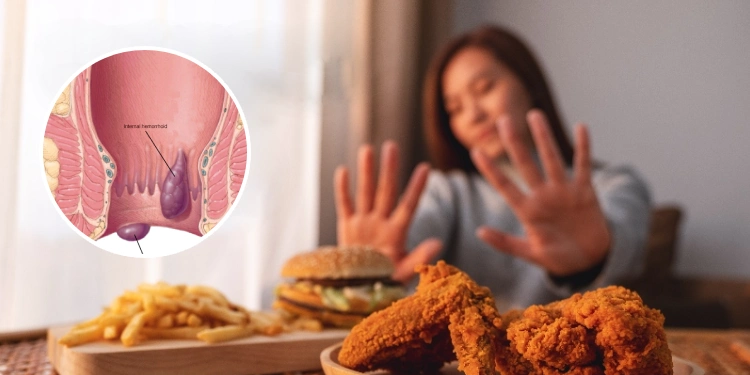
Did you know that nearly 40% of adults worldwide experience piles at some point in their lives? In India alone, it is estimated that 1 in 10 adults suffers from this condition, with dietary habits being a major contributing factor. Piles, also known as hemorrhoids, are swollen veins in the rectal or anal area that can cause discomfort, pain, and bleeding.
While factors like constipation, prolonged sitting, or pregnancy increase the risk, your diet plays a crucial role in managing and preventing piles. So, what are the best foods to eat for relief? What should you avoid to keep symptoms at bay?
Let’s answer these questions and explore how dietary changes can help manage piles effectively.
What Are the Best Foods to Eat for Piles?
A fiber-rich diet is the cornerstone of managing piles. Fiber helps soften stools, making them easier to pass and reducing the strain on the rectal area. Some foods that are highly beneficial include:
- Whole Grains: Brown rice, oats, whole wheat bread, and quinoa.
- Fruits: Apples, bananas, pears, and berries (rich in fiber and water content).
- Vegetables: Leafy greens, broccoli, carrots, and sweet potatoes.
- Legumes: Lentils, chickpeas, black beans, and peas.
- Seeds and Nuts: Chia seeds, flaxseeds, and almonds (consume in moderation).
Drinking plenty of water alongside a high-fiber diet is crucial to prevent constipation, which can aggravate piles.
Which foods to avoid for piles?
Certain foods can exacerbate piles by causing constipation, irritation, or inflammation. These include:
- Processed Foods: Packaged snacks, frozen meals, and instant noodles are low in fiber and can lead to constipation.
- Spicy Foods: Excessive spice can irritate the anal area and worsen symptoms.
- Refined Grains: White bread, pasta, and other refined grains lack the fiber necessary for smooth digestion.
- Red Meat: Difficult to digest, red meat can lead to constipation and worsen piles.
- Alcohol and Caffeine: These dehydrate the body, making stools harder and more difficult to pass.
Avoiding these foods can reduce irritation and support healing.
How Can a High-Fiber Diet Help in Managing Piles?
Fiber is essential for maintaining healthy bowel movements. Here’s how it helps:
- Softens Stools: A high-fiber diet increases stool bulk and water content, making it easier to pass.
- Prevents Straining: Softer stools reduce the need to strain during bowel movements, minimizing pressure on rectal veins.
- Reduces Constipation: By promoting regular bowel movements, fiber helps prevent the primary cause of piles.
Start incorporating fiber gradually into your diet to avoid bloating or gas, and pair it with adequate water intake for maximum effectiveness.
How Can You Maintain Long-Term Dietary Habits to Prevent Piles?
Adopting a balanced diet is key to long-term prevention. Here are some tips:
- Plan Meals: Ensure each meal includes fiber, protein, and healthy fats.
- Stay Hydrated: Drink at least 8-10 glasses of water daily to keep stools soft.
- Limit Junk Food: Reduce the intake of fried, processed, or sugary foods that can disrupt digestion.
- Exercise Regularly: Physical activity improves digestion and reduces pressure on rectal veins.
- Monitor Symptoms: If certain foods trigger discomfort, keep a food diary to identify and avoid them.
Seek Expert Care for Piles
Managing piles effectively starts with the right diet. Incorporating fiber-rich foods and avoiding triggers like processed and spicy foods can significantly improve symptoms and support recovery. Along with dietary changes, staying hydrated and maintaining a healthy lifestyle can prevent future flare-ups.
If you’re experiencing severe symptoms or need personalized advice, consult Dr Bhavesh Doshi, one of the best pediatric surgeons in Mumbai, at Dhanvantari Hospital in Borivali. With comprehensive care and a patient-centered approach, Dr. Doshi ensures effective treatment and lasting relief for piles and related conditions.
Book an appointment today at Dhanvantari Hospital to take the first step toward better health and comfort. Your well-being is our priority!
